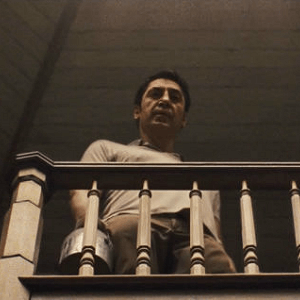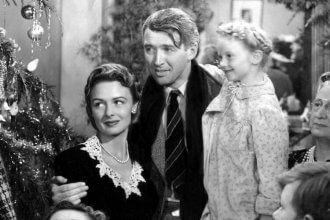Darren Aronofsky’s Mother! abounds with religious metaphors as well as social commentary via cryptic symbolism impossible to definitively decipher. A mishmash of surreal imagery combines with increasingly compounding absurdity that drives our extremely visceral experience and nearly plot-less depiction of a woman’s gradual psychological unraveling as she struggles to restore her idyllic rustic house after a fire has apparently razed it. Jennifer Lawrence portrays the titular character who seeks security, affection, and ultimately a child from her artistically gifted, yet aloof husband, Javier Bardem’s “Him.”
Law, Grace, Insanity, and Insecurity
Counterbalancing Mother’s constantly interrupted endeavors to transform a dilapidated, vintage home into a paradise exists Bardem’s character, a poet suffering under severe writer’s block, all the while allowing a constant stream of strangers and interlopers to invade the privacy of their isolated country home. Tensions mount as, firstly, Ed Harris and Michelle Pfeiffer convey quirky strangers who impose upon the young couple’s quietude and bring disregard for an unofficial no-smoking policy as well as inappropriate, yet probing, questions into Mother’s personal and sexual life. Incidentally, Pfeiffer’s character — zany, unmannered, and given to a little too much hard lemonade — can see Mother’s anxieties, and without consideration or couth challenges her to face and confront her doubts about both her own self-worth and Him’s love for her. And so begins Mother’s undoing…
 The insanity only escalates from this point. Mother’s inability to expunge and purge the house of unwanted guests proves futile and counterproductive when Harris and Pfeiffer’s sons show up arguing about disparity in the allotment that Harris’ character’s last will and testament will dole out to them. Fratricide ensues followed by an eerie makeshift wake hosted in the quaint little house during which Him exploits the family’s genuine human sorrow and suffering in order to derive poetic inspiration. He literally absorbs the grief they’re experiencing and translates it into a poignant and reflective recitation reminiscent of the metaphoric language God uses to describe the slain Abel’s cry for vindication in the book of Genesis.
The insanity only escalates from this point. Mother’s inability to expunge and purge the house of unwanted guests proves futile and counterproductive when Harris and Pfeiffer’s sons show up arguing about disparity in the allotment that Harris’ character’s last will and testament will dole out to them. Fratricide ensues followed by an eerie makeshift wake hosted in the quaint little house during which Him exploits the family’s genuine human sorrow and suffering in order to derive poetic inspiration. He literally absorbs the grief they’re experiencing and translates it into a poignant and reflective recitation reminiscent of the metaphoric language God uses to describe the slain Abel’s cry for vindication in the book of Genesis.
Exploitation and Low Anthropology
Him’s lyrically sophisticated eulogizing here reflects his tendency to exploit humanity for the sake of artistic expression — people are merely objects whence he can draw inspiration to glorify his artistic brilliance. His patronizing of the human soul finds its most explicit expression in his dynamic with Mother. He avoids engaging her intimately and this becomes the subject of the heated argument that closes the film’s first act. Him responds to the virulent charge that he won’t even “make love” to her by reluctantly engaging in intercourse on the landing of the staircase.
After a classic “fade to white,” we discover that Lawrence’s character has finally attained her identity as…mother. Intuitively, she just “knows” she is pregnant when the two awake in bed the next morning. This news, however (as well as a consequent scene in which she invites Him to feel the baby kick from within her womb), elicits an indifferent response from her husband, and in fact becomes an occasion he leverages to finally write the magnum opus that will eventually draw in the diverse, yet hostile crowd of adoring fans who begin as mere admirers of the poet’s work and incrementally become a hostile mob replete with cannibalistic, ritualistic, and cultish tendencies.
 To say the least, the low anthropologic depiction of humanity is extremely apt and accurate. There remains no limit to the depths of depravity showcased by scores of stargazed worshipers whose sensibilities are as easily persuaded by a writer’s eloquent prose as they are by ideological idolatry. A key moment in the film features Him explaining to mother that the people who have crowded, decimated, and defaced their home won’t leave because “they’re waiting.” Waiting for “what?” questions mother, to which Him can only respond “I don’t know.” The humor here is subtle, dry, and probably unintended. A probing commentary on our sheep-like proclivity to follow something, follow someone, stand for an ideal or a principle… and even violently protest in the name of a “cause” if need be. We will as easily kill for the sake of religious devotion as we will war and riot in the name of social causes.
To say the least, the low anthropologic depiction of humanity is extremely apt and accurate. There remains no limit to the depths of depravity showcased by scores of stargazed worshipers whose sensibilities are as easily persuaded by a writer’s eloquent prose as they are by ideological idolatry. A key moment in the film features Him explaining to mother that the people who have crowded, decimated, and defaced their home won’t leave because “they’re waiting.” Waiting for “what?” questions mother, to which Him can only respond “I don’t know.” The humor here is subtle, dry, and probably unintended. A probing commentary on our sheep-like proclivity to follow something, follow someone, stand for an ideal or a principle… and even violently protest in the name of a “cause” if need be. We will as easily kill for the sake of religious devotion as we will war and riot in the name of social causes.
False Gods, Allegories, and a Better Mother
Touted as an allegory of Gaia (Mother Earth) and her alleged relation to a creator god, Mother! serves as a classic case of the human capacity to imagine and reinvent God in our own image — the essence of what the second command in the Decalogue condemns (see Exodus 20) and the very predicament with which Romans 1 indicts all of us. Bardem’s Him whom we are to regard as “God” in this narrative more closely resembles fallen, broken humanity than the sovereign, omnipotent, just, and merciful God Scripture describes. He craves human approval and desecrates the value of the human soul. He sacrifices humanity in order to validate himself. The God of the Bible literally takes on humanity (the incarnation) and sacrifices Himself as a human in order to elevate the dignity of created persons.
If there is any grace that pervades this film, we see it in Mother who indiscriminately gives, gives, gives, and gives to Him until she can give no more…literally offering Him to dig into her chest to remove her heart as the final divestment of her very being. She reminds me of a better mother — what the apostle Paul called the heavenly Jerusalem, “the mother of us all” (Galatians 4). Loosely implied in this expression is the ancient promise God made to the people who destroyed His perfect home, His perfect world. You see, there’s a true and better narrative in which the unraveling of the world began when a stranger evoked doubt in a woman’s mind. The restoration of that world would come because God promised to redeem all things through that woman’s womb. “And I will put enmity between you and the woman…between her seed and your seed…he will crush your head and you will bruise his foot.”





